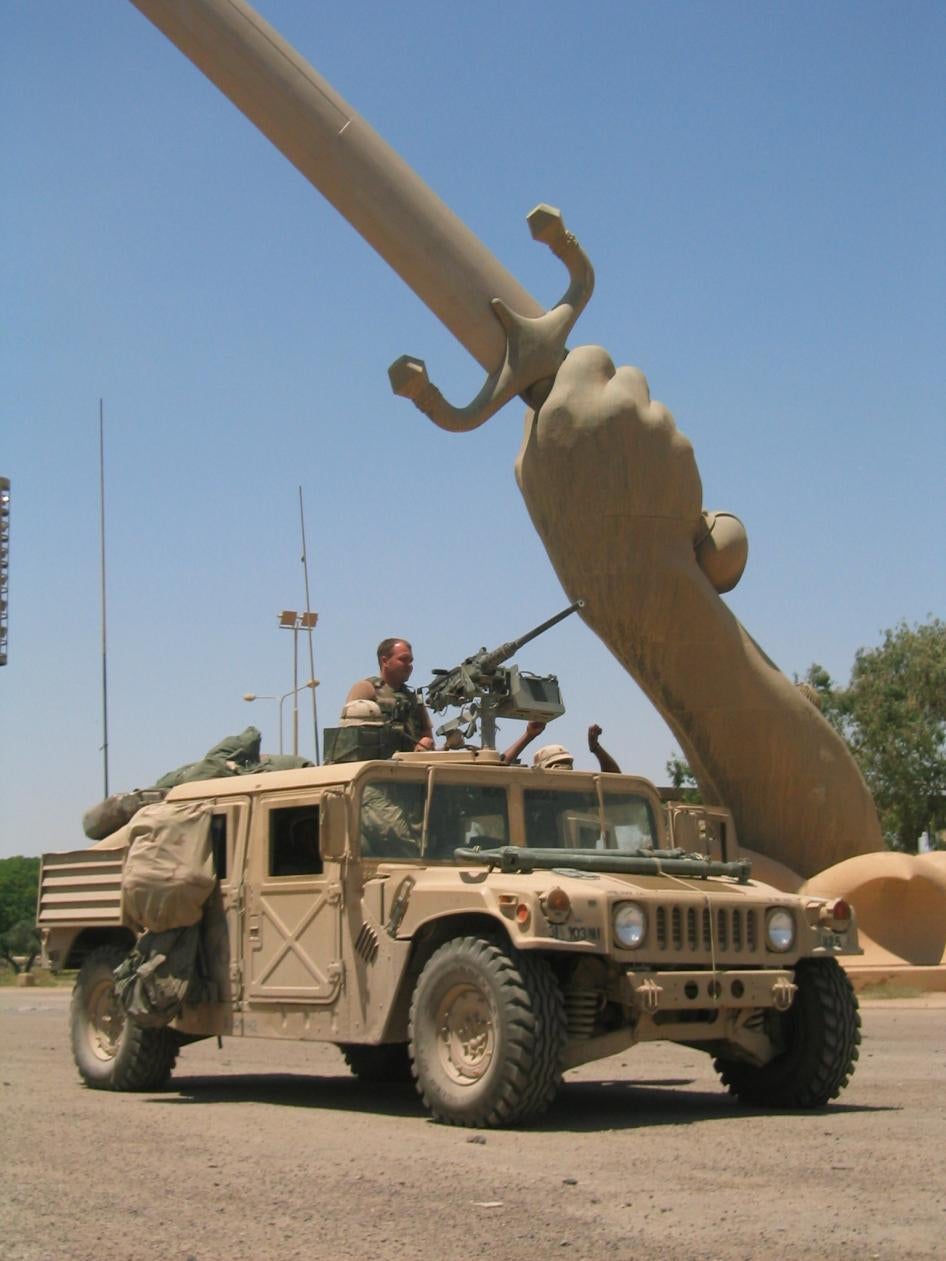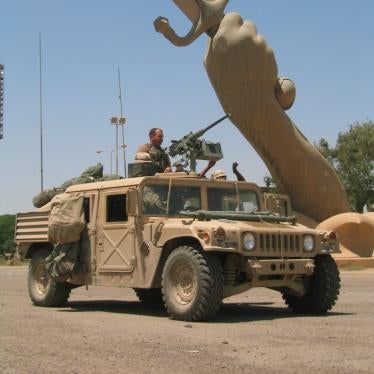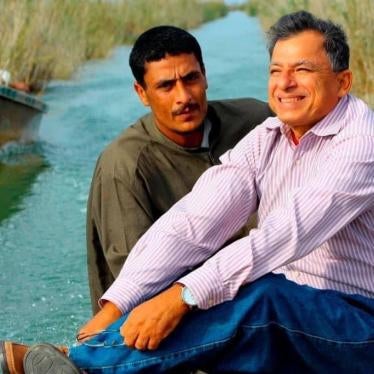I remember the day in 2016 when I became certain that Iraqi governments had no interest in advancing accountability for victims of human rights abuses. Since 2003, Iraqi authorities had refused to engage appropriately with Human Rights Watch (HRW). They hardly ever granted our meeting requests or even replied to our letters. Whenever HRW’s reports on abuses in Iraq came out, the government at the time would invariably criticize our work as one-sided, often claiming wrongly that we had not given the authorities an opportunity to respond. We were not alone in this. The broader human rights community in Iraq was also being ignored.
By late 2016, following HRW’s documentation of the disappearance in late May and early June that year of over 600 men – almost all Sunni Arabs – during the military operation to retake Fallujah, it felt more urgent than ever to find someone in the government willing to meet with us and engage with our findings and recommendations. I remember one woman from the al-Mahamda tribe telling me during the HRW investigation that she had gone from office to office trying to get news of her husband and son, who were both taken during military operations. She was exhausted when we spoke, worn down after being repeatedly ignored.
Following considerable external pressure, Prime Minister al-Abadi publicly stated on June 4, 2016, that he had created a committee to investigate the Fallujah operation. The establishment of such a committee was a rare opportunity and we were keen to seize it.
After calling in favors from influential Iraqi ambassadors abroad who were supportive of HRW, we were finally granted a meeting with a representative of the Prime Minister’s Office. After lambasting our work for 15 minutes, the staff member who met with us agreed that we needed a point of contact on the government side.
And so, a week later, I found myself pulling up outside a building in the International Zone, excited by the prospect of finally meeting with a government official mandated to engage on human rights issues. I would be meeting a senior human rights expert, so I was told. But, within minutes of entering his office, I formed the view that neither he nor the government of which he was a part had any meaningful interest in concerning themselves with human rights. Not one bit.
The meeting, as I interpreted it, was a calculated snub and dismissal of human rights by the Iraqi government. The office we met in was the most dilapidated of all the Saddam Hussein-era buildings I had seen in Iraq. The appearance of this crumbling structure – with an elevator that had apparently not functioned in years, chipped paint, deeply stained and loose carpeting, and walls that looked like they were about to give way – added to the impression of an institution that held no importance for those in power.
It seemed to me that the Iraqi government could not have sent a clearer signal that it had no interest in listening, much less responding, to suggestions from HRW or other human rights groups about how to better honor Iraq’s commitments under its own laws and the international treaties it had ratified. My initial judgment was confirmed by the man I met. He made it clear within moments of my sitting down that he wielded no power whatsoever and would be unable to assist with any requests for information or engagement.
A few weeks later, I was back in the International Zone to meet the ambassador of a country that publicly pronounces, and is proud of, its commitment to human rights. Still struggling to regain my optimism after that desultory meeting with the Iraqi official, I raised concerns that months after the disappearances, there was no sign of any output from the Fallujah investigative committee. I asked this normally sympathetic ambassador whether he was continuing to press the government on accountability.
In brief, he responded, and the answer was no. He told me that the priority of the international community was to empower the current prime minister and ensure that he remained in office. In his view, publicly highlighting and raising concerns about abuses attributed to the current government could undermine that goal. "We will raise all of these human rights concerns with the prime minister," the ambassador promised, "after the elections." Procrastination was a common tactic among representatives of foreign governments working in Iraq.
Al-Abadi never made it to a second term in office. And, perhaps predictably, nothing ever came of the investigative committee he established. This was not the first time in Iraq’s recent history that abuses on this scale had gone unpunished. But in this case, there seemed to be a widespread sense of disinterest about these specific abuses among government officials, the diplomatic community, and parts of Iraqi civil society. Because the victims of those abuses were men who had lived under – and therefore perhaps had even been linked to – Islamic State, to many who claimed to be concerned with human rights, these seemed not to be victims worthy of much attention.
In late 2016 and early 2017, the battle for Mosul unfolded. Both Islamic State and Iraqi forces committed war crimes, but members of the Iraqi authorities and some foreign diplomats alike told me the crimes were not worth raising because of the "unsavory" nature of the victims. Evidence of such crimes was quietly left alone. In the months after the battle, a new class of victims of wide-ranging state abuses began to emerge – families tainted by their alleged links to men who had joined Islamic State. These victims were seen as more deserving, because they were predominantly women and children. The diplomatic community, along with some members of the government, did advocate an end to many collective punishment measures. But those practices continued, and accountability again proved elusive.
I was back in the International Zone in late 2019 to meet the successor to the Western ambassador mentioned earlier. The new ambassador expressed his shock at the acts of excessive force that were killing hundreds of protesters in the streets of Baghdad and other cities in the center and south of the country. He was astounded that such acts could go unpunished. After all, "we are talking about Shia youth being shot at and killed," he said. This view was shared by many people I spoke to in the International Zone, who had assumed that, while some communities were more likely to be victimized by the authorities in an ethno-sectarian political system, the Shia majority would be spared.
I was less surprised, though, that patterns of abuse had become ingrained – and that abuses no longer seemed to discriminate by religious belief. I was alarmed by the ways in which impunity appeared to have metastasized throughout Iraq’s political order. A different prime minister created another committee to investigate violence and killings, which this time had been directed at peaceful protesters. This committee has also failed to produce any meaningful results.
Pushing for accountability
HRW is in the business of meticulously documenting human rights abuses, making the findings public and presenting those findings directly to the people responsible for the abuses. This approach is based on the idea that by making public governments’ human rights and laws-of-war abuses, we raise the cost of continuing such abuses. We also publish recommendations with our findings, the aim of which is to get governments – whether out of conviction, embarrassment or other motivations – to cease their abuses and hold those responsible accountable.
If a government is unwilling to act, we turn to allies including civil society partners and other governments that have influence. Meetings with diplomats can form a major part of the human rights ecosystem – groups like HRW document abuses and suggest reforms, and then brief sympathetic members of the international community on their findings and recommendations. Diplomats from countries with important bilateral relationships or multilateral influence often share our concerns and join quiet, but sometimes effective, campaigns to persuade a government to change its behavior.
Although my meetings over the years with civil society partners were invaluable to HRW’s work, and our ability to support the human rights community within Iraq, my interactions with the government and ambassadors in Baghdad reported above demonstrate clearly that, in Iraq at least, the system of engagement has been broken for years due to a lack of adequate political will. Victims seeking accountability for abuses have suffered the consequences.
Now what?
It appears that once the precedent for a lack of accountability for human rights abuses has been established, it becomes acceptable – and even expected – over time, across many spheres and settings. A short-term political bargain can escalate into a general way of doing business. Impunity can then be perpetuated and the idea of enforcing any semblance of law drifts ever further out of reach.
Once the precedent for a lack of accountability for human rights abuses has been established, it becomes acceptable – and even expected – over time, across many spheres and settings. A short-term political bargain can escalate into a general way of doing business.
In Iraq, plenty of stakeholders have tried to hold government accountable post-2003. Iraqi activists and victims continue to document abuses and are willing, at considerable risk to themselves, to testify in public. Watchdogs like the Iraqi High Commission for Human Rights try to use their limited powers to check government abuses. At times, some government officials – from members of parliament to executive branch staff and, occasionally, a powerful figure like a minister or even the president – will act to affirm human rights. One example is the choice that former Iraqi president Barham Salih made to delay signing off on a number of death sentences, citing concerns about the standard of the trials that had led to the death penalty being imposed in those cases.
But such gestures have not changed the overall trend away from accountability. In my experience, too many Iraqi and international representatives were willing to overlook crimes committed by state security forces in the interests of achieving, as they saw it, "stability" in the short term. Even backers of human rights in different settings and situations, both in the Middle East and elsewhere, ignored crimes committed against communities in Iraq they ultimately considered undesirable. By 2019, this turning of "blind eyes" had helped to ingrain patterns of impunity into Iraqi governance structures. Some Iraqi authorities could and did target anyone they chose to, including peaceful demonstrators, without fear of consequence.
Iraq may not be exceptional in this regard. But Iraqi authorities have been able to behave in such ways for so long in part because of inconsistent scrutiny by the international community, members of which appear to be advancing competing interests. This failure to promote and protect human rights comes at the expense of the interests of the Iraqi people – including the al-Mahamda woman, who, more than six years after our first meeting, still has no news of whether her husband and son are alive.










